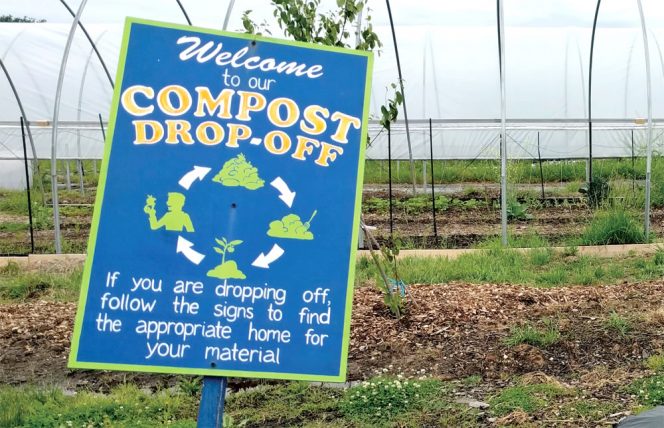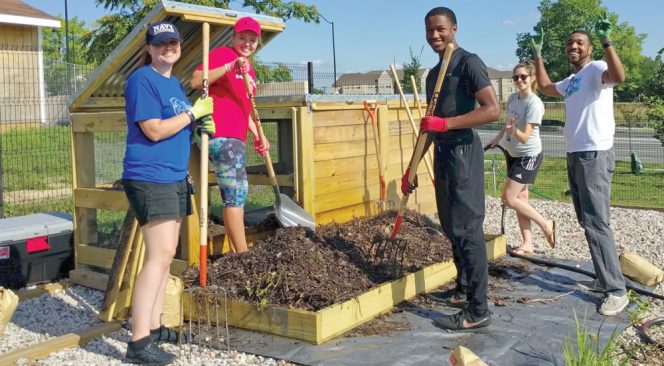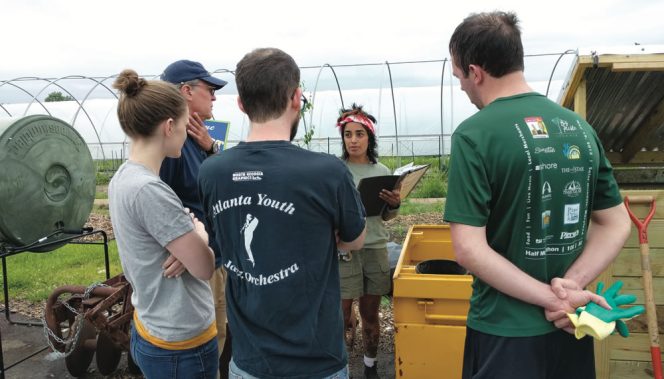The Neighborhood Soil Rebuilders program, developed by the Institute for Local Self-Reliance, teaches community leaders how to compost locally in order to support food production.
Linda Bilsens Brolis
BioCycle January 2018

Real Food Farm has established a model small-scale community-centered composting site in northeast Baltimore. A 5-bin rat-resistant system processes hundred of pounds of food scraps from the farm and its composting cooperative’s members.
While the value of compost for remediating disturbed soils is not always understood by the general public, gardeners and farmers tend to be aware of compost’s role as a source of needed organic matter that improves soil structure and function. Lesser understood benefits include compost’s ability to bind heavy metals and filter contaminants—making them less available to plants and people—and its ability to restore the biological activity essential to plant health. Composting training programs for the general public, such as Master Composter programs, equip citizens already enthusiastic about compost with additional evidence of its benefits, creating an army of advocates at various levels of civic engagement and influence.
In 2014, the Institute for Local Self-Reliance’s (ILSR) Washington, D.C. office launched the Neighborhood Soil Rebuilders (NSR) composter training program, which is based on the Master Composter model. Developed in partnership with a local urban farm, ECO City Farms based in Edmonston, Maryland, the program adapts the rigor of commercial composting industry practices to the small scale and teaches community leaders how to compost locally in order to support food production. In addition to teaching how to avoid nuisance odors, pathogen problems, and unwanted vectors, the NSR program demonstrates how to produce high-quality compost while engaging the community in the process. The goal is to increase the pool of community leaders who know how to manage well-operated community composting systems such as those at schools, community gardens, and urban farms.
Opportunities And Caveats
Local composting has an important role to play within a region’s composting infrastructure and should be encouraged as a first priority. Small-scale sites are typically exempt from state compost permitting guidelines, which makes establishing a project fairly simple and fast. The systems used at this scale also are relatively inexpensive. When produced locally, compost is more likely to make it back into local soils, at the same time that a culture of composting awareness and engagement is established. ILSR has long documented the benefits of locally-based composting and believes it is the foundation for larger scale municipal initiatives.
Common limiting factors for urban composting at this scale are the availability of labor (many are managed by volunteers), reliable availability of sources of carbon (which can be a major challenge in the city), and secure spaces (all feedstocks, compost piles, tools need to be secured to keep animals and people out). Even with the exemption from state composting permitting guidelines, there may be restrictions, such as limiting how much material can be handled from off-site. Operators also need to have clear and widely-accepted best management practices (BMPs) to follow, which are currently lacking for small-scale sites. The material costs for a high-quality rat-resistant composting system are inexpensive at roughly $1,000, when compared to commercial-scale systems, but volunteer-run projects tend to be low budget. Passively aerated composting in open piles, while possible in an urban setting, is not recommended unless BMPs such as use of thick biolayer caps and attentive site hygiene is guaranteed.
Well-run community composting demonstration sites are critical to people’s understanding of what good compost is and how it is made. Putting the concepts of the NSR program into action, ILSR is developing BMPs for small-scale composting, and collaborating with local partners to establish a number of model community-scale composting sites and operations in Washington, D.C. and Baltimore.
District Of Columbia Initiatives
Howard University Community Composting Cooperative
Community-based composting infrastructure has exploded in the Washington, D.C. area over the last few years. The DC Department of Parks and Recreation (DC DPR) created a Community Compost Cooperative Network, which has roughly 50 cooperatives located throughout the city. The 3-bin composting system employed by the DC DPR Cooperative Network is Urban Farm Plans’ Compost Knox system, which has an estimated throughput of one ton/month of material. The modular nature of its design allows additional “cubes” to be added to the chain of bins, expanding the system’s capacity. (Plans are available for download on the company’s website).
Jeffrey Neal, a graduate of ILSR’s NSR Master Composter and Advanced Master Composter programs, established a community composting demonstration site at the Howard University Community Garden as his NSR capstone project in 2015. Neal partnered with DC DPR to build the rat-resistant composting system and establish a DPR Compost Cooperative, and ILSR to build the site into a model for urban community composting BMPs. This project, now called the Howard University Community Compost Cooperative, is also a collaboration with the Howard University Office of Sustainability and Compost Cab, a local food scraps collection service.. The site has diverted nearly 10 tons of food scraps from disposal since 2015 and created 4 tons of high quality finished compost — confirmed by both laboratory tests, and having won the D.C. State Fair’s compost competition two years in a row. In addition, the Howard University installation has had nearly 200 visitors, hosted representatives from various D.C. departments (General Services and Public Works) and other communities (Baltimore, Philadelphia, North Carolina), and was featured in a Washington Post article about the future of composting in D.C. earlier in 2017. Neal now runs his own urban composting solutions company, Loop Closing.

The University of the District of Columbia’s East Capitol Urban Farm (ECUF) has transformed a vacant parcel of land into an urban food hub. A composting system was added last June, and ECUF gardeners participate in workdays at the site.
The University of the District of Columbia’s (UDC) East Capitol Urban Farm (ECUF) in D.C.’s Ward 7 has transformed a vacant parcel of land into an urban food hub — a community resource that promotes urban agriculture, and aims to improve food access and nutrition education. The ECUF inclxudes more than 80 gardening beds for Ward 7 residents, a community plaza, a play space for children, a hydroponics project, and a farmers’ market. The UDC — through its College of Agriculture, Urban Sustainability and Environmental Sciences (CAUSES) — manages ECUF and led the effort to establish it in 2015.
ILSR is collaborating with CAUSES to establish a composting project, a key missing component of ECUF’s goal toward zero waste. In June 2017, ILSR staff coordinated a compost bin-building workshop for ECUF staff, led by Urban Farm Plans. Because of this training, UDC interns and staff have been able to build two additional composting systems at other UDC food hubs in the District.
The community surrounding the ECUF, particularly the gardeners, were the target of this project. They have welcomed the composting system, and 12 have joined the newly launched ECUF Compost Project. These members have agreed to work at least 2 hours/month, and follow agreed upon BMPs in exchange for access to bring food scraps from home and adding waste from their garden plots, and the right to use the finished compost. These members were eager to join the project not only as a way to reduce the amount of waste they throw away, but also because they understood the benefits of compost-amended soils. They come to workdays to learn about the composting process, BMPs and how to scale up the amount of food waste going into the system. BMPs include: mixing food waste (not including dairy, meat, or fats/oil/grease) with carbon before adding it to the system; recording pile temperatures and weights of food scraps added; monitoring for odors and vector disturbances; and turning and watering piles regularly.
Interest continues to grow, and a plan is being developed by ILSR and ECUF Compost Project members to hand off management of the project to the community. The UDC is now using the model community composting project to complete its Food Hub Education program at the Farm.
Dix Street Garden
ILSR is also collaborating with Soilful City to establish a community composting project at the Dix Street Garden (also known as the Clay Terrace or Soilful City Garden) in Ward 7. Xavier Brown, a D.C. native, runs Soilful City and is an NSR program graduate. He completed his NSR capstone project by establishing the DPR Compost Cooperative at Project EDEN (Everyone Deserves to Eat Naturally), part of a church community in Ward 8, where he is still a manager. Project EDEN is an innovative youth-focused urban garden initiative that brings fresh fruits and vegetables, workforce development, and transitional employment opportunities to underserved youth and adults. It offers social and entrepreneurial opportunities in a community blighted by poverty and violence. In the past 3 years, EDEN has hired 36 youth and young adults ages 14 to 22 and has provided fresh produce to more than 350 families.
With Brown’s help, the community surrounding the Dix Street Garden, which is part of the Richardson Dwellings DC Public Housing project, is now seeking similar opportunities. He is using composting and gardening to provide the community an opportunity to gain life and job skills training and create microenterprises. This project is specifically giving two community members, Boe Luther and Wallace Kirby, supplemental income. Luther and Kirby, who are the founders of Hustlerz 2 Harvesters, focus on creating positive activities for citizens returning from incarceration and sharing the building and gardening skills they themselves learned in prison.
A group of 10 core community members has been recruited, and are participating in weekly composting gatherings and planning sessions. Outside of the core members, many others have come to check out the garden. Brown, Luther and Kirby utilize the time to discuss composting as well as other community concerns, making the garden a safe space for its members. People from other communities have come to the space and inquired about how to create something similar where they live.
Baltimore, Maryland Initiatives
Real Food Farm
In partnership with Civic Works’ Real Food Farm in Baltimore, ILSR has established a model small-scale community-centered composting site in northeast Baltimore. Real Food Farm grows fresh produce on 8 acres in and around the Clifton Park neighborhood and serves two nearby food deserts. In 2016, ILSR partnered with Real Food Farm to bring the NSR Master Composter program to Baltimore. ILSR built Real Food Farm a 5-bin rat-resistant composting system, which was central to the hands-on instruction during the 6-week NSR course. The system now serves as the backbone for the composting cooperative, which is processing hundreds of pounds of food scraps from the farm and the cooperative’s members.

Sophia Hosain, a graduate of the NSR program and FoodCorps service member at Real Food Farm, trains community members on how to participate in the farm’s new Compost Co-op.
Filbert Street Community Garden
The Curtis Bay neighborhood of Baltimore is a historically disenfranchised community living in Maryland’s most polluted zip code. The shipbuilding industry that once provided employment has been replaced with chemical and pesticide plants, petroleum refineries, and a medical waste incinerator. The community recently rallied to prevent an additional, 4,000 tons/day incinerator from being built. Sustainable workforce skill training and employment opportunities are sorely needed in Curtis Bay, as is ready access to healthy food assistance programming.
Under a grant from the Abell Foundation, ILSR has partnered with the Chesapeake Center for Youth Development (CCYD) to launch a youth-led bike-powered food scraps collection and community composting initiative at the Filbert Street Garden in Curtis Bay. Together, a youth entrepreneurship program is being created to train participants in workforce skills, food access programming and community-scale composting. CCYD has hired two students from the nearby high school for the bike-powered food scraps collection and composting enterprise, which will eventually serve an estimated 50 households and businesses in the Federal Hill and Curtis Bay neighborhoods.
These students are gaining guided, hands-on experience supporting CCYD programs that improve access to fresh produce for as many as 250 local community members, and will manage a small-scale composting operation and its expansion. One goal of the project is to provide year-round employment with workforce skill training in billing, route development, customer outreach and marketing. ILSR built the 3-bin composting system at Filbert Street Garden and trained the youth on how to compost. Finished compost will be used to grow more food.
Another key collaborator — and the inspiration for the youth-led bike-powered composting project — is BK ROT in the Bushwick neighborhood of Brooklyn, New York. BK ROT was started by Sandy Nurse and Renee Pepperone in 2013 and is a community-supported operation employing four local youth year-round to collect food scraps from the surrounding community by bike (see “Building Community Composting In Bushwick, Brooklyn,” March/April 2017). An article in the January 2017 issue of BioCycle, “Bike Powered Food Scraps Collection,” is a report on an ILSR survey on bike-powered food scrap collection.
Linda Bilsens Brolis is the Project Manager for the Institute for Local Self-Reliance’s Composting for Community Project and the Neighborhood Soil Rebuilders (NSR) Composter Training Program. She has managed the NSR program since it was launched in 2014, and is developing a national NSR program replication toolkit and best management practices. She is a certified Compost Facility Operator for the state of Maryland, and has trained with composters in Austria. Follow the Institute for Local Self-Reliance on Twitter and Facebook and, for monthly updates, sign-up for ILSR’s general newsletter.










